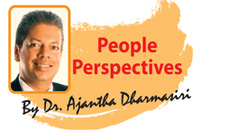ROI through POI: Insights to a new investment
 Sri Lanka has emerged as an investor-friendly destination.
Investments should ensure expected returns. That's why Return on
Investment (ROI) becomes a critical factor. Sri Lanka has emerged as an investor-friendly destination.
Investments should ensure expected returns. That's why Return on
Investment (ROI) becomes a critical factor.
Like investing money, there is a growing awareness about another
investment - investing knowledge.
It was Peter Drucker who said that knowledge has become the capital
rather than a capital in the post-capitalistic era.
This is an interesting way of looking at how people contribute to
organisations.
Knowledge is generally referred to what is known.
The Oxford dictionary describes knowledge as 'facts, information, and
skills acquired through experience or education, the theoretical or
practical understanding of a subject'. It has become a capital that is
being invested, anticipating returns.
Knowledge worker
We commonly use terms such as knowledge worker and knowledge work.
According to Drucker, knowledge work is about sensing, judging, creating
ideas and expert opinions, building networks of relationships and
producing value using knowledge and information.
 It is all about knowledge in action. Then, who is a knowledge worker?
He or she is an employee who is simultaneously an investor and owner of
the enterprise he or she is working for. It is all about knowledge in action. Then, who is a knowledge worker?
He or she is an employee who is simultaneously an investor and owner of
the enterprise he or she is working for.
We see an emergence of knowledge work in Sri Lanka, in line with the
global trend. Knowledge is acquired through learning. Learning is
essentially an individual phenomenon.
In other words, learning takes place within a person. The person
becomes knowledgeable. That's where the game starts. Knowledge is power.
Michel Foucault vividly illuminates us on this. "Power is exercised
by virtue of things being known and people being seen."
Power
He said, "The exercise of power perpetually creates knowledge and
conversely, power as knowledge".
Since knowledge is power, people have power.
They unleash that power by contributing to their institutions. Such a
phenomenon poses a key challenge for people managers, including HR
professionals.
That is, how to harness individual power.
I propose the term, Power of Individual (POI) to represent the wide
array of contributions a person makes by investing his or her knowledge.
When knowledge workers come up with creative ideas converting them
into concrete actions, the creation of consistent processes for results
has to happen. Therefore, the key challenge can be further clarified as
the need to channel POI to obtain ROI.
POW
POI demonstrates how an employee can contribute creative ideas to the
organisation. In some western societies, it has taken another twist,
which I call POW. One POW may lead to another POW. Power of women (POW)
may make men, prisoners of war (POW).
The essence is the unleashing of creativity, with growing emphasis
placed on softer dimensions of management. Imagination with idea
generation is what a person does at the inception. There should be
interactive team work.
Bartlett and Ghoshal offer interesting insights on the power of the
individual. According to them, instead of forcing a person to conform to
the company's policies and practices, the overall objective is to
capture and leverage the knowledge and expertise that each
organisational member brings to the company.
They said, "The notion of 'organisational individual' is giving way
to a concept we call 'the individualised organisation' - one that
capitalises on the idiosyncrasies and even the eccentricities of
exceptional people by recognising, developing and applying their unique
abilities."
The best way to understand the difference between 'organisational
individual' and 'individualised organisation' is to look at a few
examples. Gone are the days where people looked, dressed, spoke and
behaved alike. Such a uniformity demanded people to adjust and to adhere
to their organisation, to the fullest.
Different
It reminds me of a regimental organisation or even perhaps the
People's Republic of China, in its post-revolutionary era.
 Today, the scenario is very different. The reality is that the
organisation has to adjust itself to accommodate diverse talent, by
being a 'personalised organisation'. Today, the scenario is very different. The reality is that the
organisation has to adjust itself to accommodate diverse talent, by
being a 'personalised organisation'.
The key aspect is diversity. Flexibility is needed to accommodate
diverse employee needs. Flexi-time, telecommuting, virtual teaming are
some such work arrangements.
The key aspect here is the need for talent by the organisation, and
the best way to get it is to reach out to the talent in the market by
being receptive to their needs. Software companies and advertising
agencies are ready examples in this respect.
The rising power of people by unleashing creativity should not be
perceived as a threat to team work. In fact, it intensifies teaming.
Interactive teams are the only way to bridge the gap between people and
their institution.
When creative people invest their ideas, the returns come in the form
of innovations in the organisation.
Such innovations can create new vistas in broadening the product or
service offerings.
The team at Sony who worked on Walkman, the team at Google who strive
for global customer reach, a local insurance team who kept the other
insurers 'out of the spot' are some such examples.
Hence, the equation is seemingly simple: ROI through POI. Yet, the
amount of thinking and doing needed from people managers is immense in
the true spirit of achieving sustained results. |

